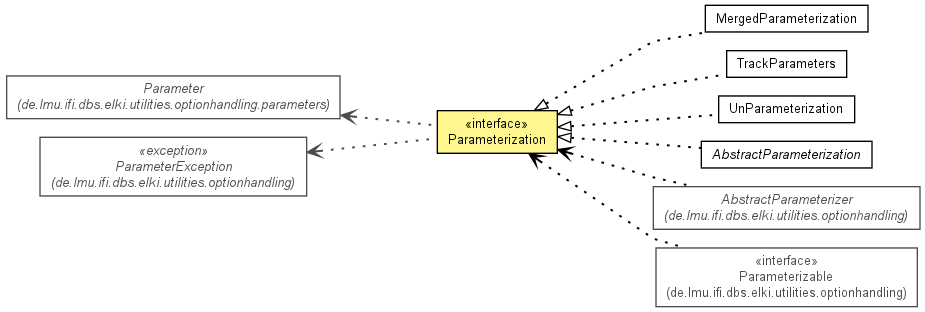| Overview | Package | Class | Use | Tree | Deprecated | Index | Help |

|

|
|||||||||
| PREV CLASS NEXT CLASS | FRAMES NO FRAMES | |||||||||
| SUMMARY: NESTED | FIELD | CONSTR | METHOD | DETAIL: FIELD | CONSTR | METHOD | |||||||||
public interface Parameterization

Interface for object parameterizations.
See the de.lmu.ifi.dbs.elki.utilities.optionhandling package for documentation!
| Method Summary | ||
|---|---|---|
boolean |
checkConstraint(GlobalParameterConstraint constraint)
Check a parameter constraint. |
|
Parameterization |
descend(Object option)
Descend parameterization tree into sub-option. |
|
Collection<ParameterException> |
getErrors()
Get the configuration errors thrown in grab(de.lmu.ifi.dbs.elki.utilities.optionhandling.parameters.Parameter) |
|
boolean |
grab(Parameter<?,?> opt)
Get the option value from the Parameterization. |
|
boolean |
hasErrors()
Return true when there have been errors. |
|
boolean |
hasUnusedParameters()
Check for unused parameters |
|
void |
reportError(ParameterException e)
Report a configuration error. |
|
boolean |
setValueForOption(Parameter<?,?> opt)
Assign a value for an option, but not using default values and throwing exceptions on error. |
|
|
tryInstantiate(Class<C> c)
Try to instantiate a particular class. |
|
|
tryInstantiate(Class<C> r,
Class<?> c)
Try to instantiate a particular class. |
|
| Method Detail |
|---|
boolean grab(Parameter<?,?> opt)
opt itself!
In particular grab(de.lmu.ifi.dbs.elki.utilities.optionhandling.parameters.Parameter) can return true when
Flag.getValue()
returns false! Instead the semantics of grab are those of Parameter#isDefined().
This method will catch ParameterExceptions and store them to be
retrieved by getErrors().
opt - Option to add
boolean setValueForOption(Parameter<?,?> opt)
throws ParameterException
opt - Parameter to set
ParameterException - on assignment errors.Collection<ParameterException> getErrors()
grab(de.lmu.ifi.dbs.elki.utilities.optionhandling.parameters.Parameter)
void reportError(ParameterException e)
e - Destination to report errors toboolean hasUnusedParameters()
true if at least one parameter was not consumedboolean checkConstraint(GlobalParameterConstraint constraint)
constraint - Parameter constraint
Parameterization descend(Object option)
ClassParameter.instantiateClass(de.lmu.ifi.dbs.elki.utilities.optionhandling.parameterization.Parameterization).
You only need to call this when you want to expose the tree structure
without offering a class choice as parameter.
option - Option subtree
boolean hasErrors()
<C> C tryInstantiate(Class<C> r,
Class<?> c)
C - return typer - Restriction classc - Base class
<C> C tryInstantiate(Class<C> c)
C - return typec - Base class
|
|
|||||||||||
| PREV CLASS NEXT CLASS | FRAMES NO FRAMES | |||||||||||
| SUMMARY: NESTED | FIELD | CONSTR | METHOD | DETAIL: FIELD | CONSTR | METHOD | |||||||||||